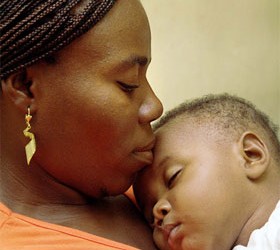By Caribbean Medical News Staff
The Pan American Health Organization/World Health Organization (PAHO/WHO) is urging increased support for breastfeeding, so that more mothers begin nursing their babies during the first hour of life, breastfeed them exclusively up to age 6 months, and continue breastfeeding up to age 2 or beyond, while providing complementary foods. These practices could save as many as one million children’s lives worldwide each year.
In most Latin American and some Caribbean countries, fewer than half of babies begin to nurse within 60 minutes of birth, and over 60% of infants are not fed exclusively with mother’s milk up to the sixth month, as recommended by PAHO/WHO.
“Breastfeeding is one of the most effective ways to ensure children’s good health and survival,” said PAHO Director Carissa F. Etienne. “Although breastfeeding has increased in many countries in the Americas, much remains to be done to optimize feeding practices.”
Practically all women can nurse, provided they have good information and adequate support from their families, from the health system, and at their places of work or study. Dr. Etienne urged “all sectors of society to commit to greater efforts to support mothers who breastfeed, so that they and their babies can enjoy the many benefits of this practice.”
Mother’s milk is the best food for newborns and young babies. It provides all of the necessary nutrients, contains protective antibodies, and requires no preparation. Breastfeeding is also good for mothers as it helps with weight loss after childbirth and reduces the risks of type 2 diabetes, breast and ovarian cancers, and anemia.
Improving and extending breastfeeding
The theme chosen for World Breastfeeding Week this year is “Breastfeeding Support: Close to Mothers.” The slogan underscores the need to guide and motivate mothers during pregnancy and in the days and weeks following delivery.
Counseling for mothers during pregnancy and in the crucial days after childbirth―through mothers’ support groups or by health professionals―can improve these practices and extend breastfeeding.
Studies indicate that peer counselors effectively improve the rate of breastfeeding initiation, duration, and exclusivity. In low- and medium-income countries, support from peer counselors reduces the risk that exclusive breastfeeding will be interrupted by 30%.
PAHO has produced a guide that outlines ways to ensure optimal support for mothers and breastfeeding and also provides information about breastfeeding practices in Latin America and the Caribbean. The guide is available at: http://bit.ly/169u7bv
For satisfactory breastfeeding, mothers need:
• Guidance and support from peer counselors.
• Support from health systems, including information during prenatal care and delivery to facilitate bonding with their babies and promote early initiation of breastfeeding as well as guidance and support from trained personnel during the months following birth.
• Legislation that protects breastfeeding as well as the extraction and storage of mother’s milk at women’s places of work or study.
• Creation of national breastfeeding commissions, legislation regulating the marketing of breast-milk substitutes, and institutionalization of paid maternity leave.
• Special planning and support in situations involving natural disasters, refugee camps, or critical illnesses.
• Environments favorable to breastfeeding that reflect a culture in which mother’s milk is seen as the best food for babies and in which mothers feel able to provide it.
PAHO was founded in 1902 and is the oldest international public health organization in the world. It works with all the countries of the hemisphere to improve the health and the quality of life of the peoples of the Region. Its Secretariat serves as the World Health Organization’s Regional Office for the Americas.
- Home
- News
- Views
- Opinion
- Editorial
- Features
- Clinical
- Regions
- Anguilla
- Antigua and Barbuda
- Bahamas
- Barbados
- Belize
- Bermuda
- British Virgin Islands
- Cayman Islands
- Dominica
- Grenada
- Guyana
- Jamaica
- Montserrat
- Saint Kitts and Nevis
- Saint Lucia
- Saint Martin
- Saint Vincent and the Grenadines
- Saint-Barthélemy
- Trinidad and Tobago
- Turks and Caicos Islands
- US Virgin Islands














